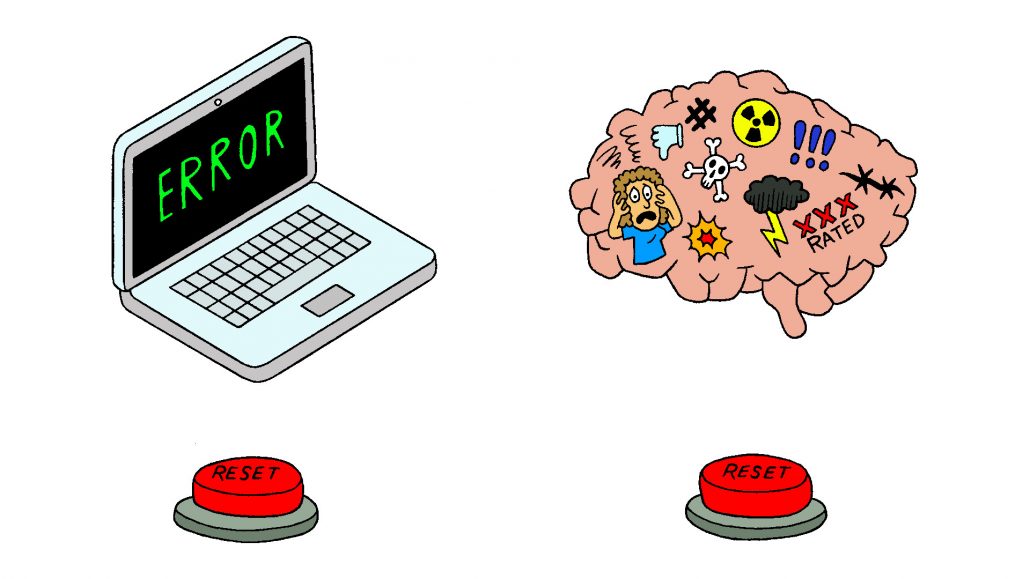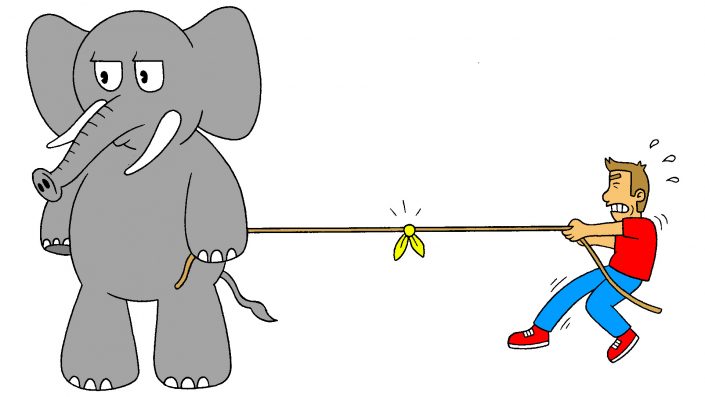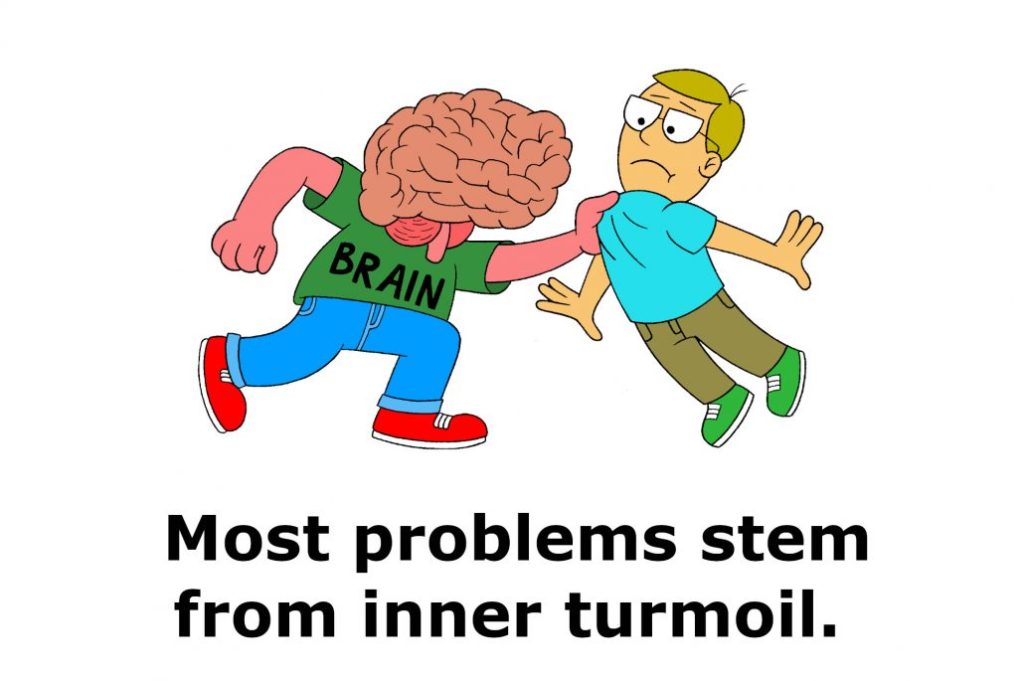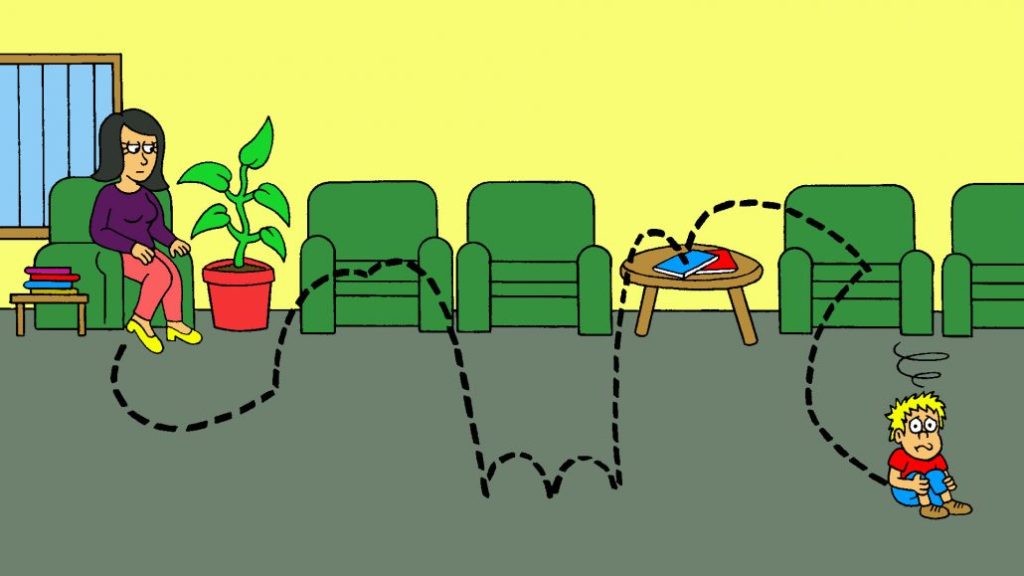
Meditation
Most people have had a computer lock up on them. Everything is working fine, then suddenly the program glitches, gets stuck in an endless loop, and the screen freezes. At that point there is no reasoning with it. You can click the mouse all you want, type commands, wave your hands, and nothing happens. The only way forward is to press the reset button and start fresh.
The human brain can do the same thing. We get stuck in loops such as worry, overthinking, replaying old conversations, or predicting disasters that have not happened yet. It runs and runs until your mind is exhausted but no closer to a solution. That is when you need your own “reset button.”
The catch is that humans do not come with an obvious button to press. Unlike your computer, nobody taught you where to find it in the manual. Most people do not even know it exists. Meditation is how you learn to press it. Before we get there, let’s talk about what is going on in the mind when you feel “locked up.”
Two Minds, One Head
The idea of a divided mind is not new. The novel The Strange Case of Dr. Jekyll and Mr. Hyde, although fiction, captures something psychologists agree has merit. We all have two “minds” operating inside us. One is emotional and impulsive. The other is rational and deliberate. They do not always agree.

The elephant rider analogy
Social psychologist Jonathan Haidt explains this using the “elephant and rider” analogy. The elephant represents your emotional mind, and the rider represents your rational mind. At first glance, it seems the rider is in charge. The rider holds the reins, sits higher, and appears to be steering the elephant down a chosen path. In reality, the rider’s control is limited. When the elephant and rider agree, everything runs smoothly. The rider can guide the elephant with small tugs, and the elephant willingly follows. But when there is a disagreement, the balance of power becomes obvious. The elephant is much bigger, far stronger, and driven by instinct. If it decides to move in a different direction, the rider’s commands are meaningless. The elephant will go where it wants, at the speed it wants, and the rider can only hold on for the ride. This is why in moments of strong emotion, our rational side often feels powerless to intervene.

There is an old saying: “The mind is an excellent servant but a terrible master.” When the mind serves you, it is a powerful ally. It can solve problems, create ideas, plan for the future, and recall important details at exactly the right moment. It can focus your attention, filter out distractions, and help you navigate complex situations with clarity. In this role, the mind works for you, and life runs more smoothly.
But when the mind takes over as the master, the relationship flips. Instead of guiding it, you are dragged along by it. It can flood you with fear, self-doubt, or anger, pushing you to react impulsively rather than respond thoughtfully. It can trap you in endless loops of overthinking, replaying mistakes, or imagining worst-case scenarios. As a master, the mind becomes relentless, demanding your attention at all hours and filling your head with noise you did not ask for. This is when the same abilities that make it a great servant become the very tools it uses to exhaust and control you.
The solution is not to fight the elephant harder. Forcing control over the emotional side of your mind usually backfires, creating even more resistance. The real goal is to get both parts of the mind working together so that emotion and reason move in the same direction. Achieving that harmony is far trickier than it sounds. When stress takes over, the body tenses, the mind races, and the idea of “just relaxing” feels almost impossible. This is why meditation is not simply about finding a calm state. It is about slowly retraining the connection between your emotional and rational sides so they can work as partners rather than opponents.
Part of this process is learning to relate differently to your mental chatter. Chatter itself is not the real problem. Thoughts are the mind’s job, and they will keep coming whether you want them to or not. The trouble begins when you start believing every thought as if it were a fact. Many of these thoughts are exaggerated, biased, or flat-out wrong, yet they can feel convincing simply because they show up so often. If you treat every passing thought as truth, you hand over the steering wheel and let your mind take you wherever it wants, even into places that are harmful or completely unhelpful.
The key is not to silence the chatter but to change how you respond to it. You can notice the thoughts without becoming entangled in them. You can let them pass without letting them dictate your mood or your choices. Meditation teaches this skill by giving you practice in seeing the chatter for what it is—mental noise that does not have to control you. Over time, this creates the space for better decisions, steadier emotions, and a mind that works with you rather than against you.

Meditation is the key
We all have mental chatter. Thoughts pop up without asking permission. That is normal. The real problem starts when you fuse with those thoughts and believe they are automatically true.
Here is the danger. The brain has heard these same thoughts over and over for years. Even if they are lies, repetition alone can make them feel true. Psychologists call this the “illusion of truth” effect. Hear something enough times and your brain accepts it as fact, no matter how absurd it is.

ChatGPT said:
To see how ridiculous this can get, imagine a three-year-old hurling insults at you. The child might call you silly names, make faces, or shout something completely nonsensical. At most, you might be mildly annoyed, but you would probably laugh it off because you know the source. It is a toddler. Their words carry no real weight, and you would not let them dictate your mood for the rest of the day.
Now imagine responding differently. Imagine taking every word from that toddler as absolute truth. If the child calls you a “poo-poo head,” you accept it without question. You carry that label around for the rest of the day, letting it shape how you see yourself and how you interact with others. It sounds absurd, yet this is exactly what happens when we take our own negative self-talk at face value.
The inner critic can be just as irrational as a cranky three-year-old. It does not filter for truth, accuracy, or fairness. It blurts out whatever will get a reaction, and the more we engage with it, the louder it becomes. When you believe those inner insults, you are essentially handing over your self-image to the mental equivalent of a preschool heckler. The problem is not that the voice exists. The problem is giving it credibility it does not deserve. Once you see it for what it is—just noise—you can stop letting it define who you are.
If we become a servant/slave to our random thoughts, our life becomes very unstable and turbulent.
“Why am I such a loser? I shouldn’t be depressed. Something must be wrong with me. I’m a loser for feeling so bad. Only a loser would call himself a loser. I should stop calling myself a loser. I can’t stop because I’m such a loser.”
The above paragraph was probably hard to read. Just imagine how hard it would be if it was an audio playing on an endless loop in your head! It’s playing in your head for hours for many days out of the week! Only a poo poo head would meld with these thoughts.
Everybody has brain chatter. It’s normal and healthy to have it. (sort of) It can provide constructive criticism and we can benefit from it. Healthy isn’t the right word. It’s like saying that fire is healthy. Fire can be a better way to describe brain chatter. Fire is destructive but it can also be very useful! The amount of fire combined with the amount of control is what determines whether it’s useful or damaging. A candle provides light. A campfire provides warmth. If there’s no control then there’s no limit to the amount of destruction that it can cause. Just think about a major city that has no fire department! Hundreds of lives can be lost and can result in millions of dollars in damages!

You don’t have to control your thoughts’ you just have to stop letting your thoughts control you.
-Dan Millman
I like the fire analogy because it shows how destructive it can become. However, control isn’t really the right word for what’s needed with brain chatter. We all have chatter that we can’t control. That’s not the problem. It becomes a problem if we have little/no ability to shut it out or to refrain from melding with it. This statement is a mouthful. Therefore, for the sake of simplicity, I’ll refer to this concept as ‘volume control’. If our volume control is poor, our mind turns into a brain bully. Below are two false statements.
1. Trying to control the volume of the brain chatter is similar to trying to control the weather. It can’t be done.
2. It’s not worth the effort.
Meditation brings up many preconceived opinions of it. Things such as spiritual enlightenment, grandiose claims, and escapism often spring to mind. The brain is designed to think. Trying to make it not think is like asking a magnet to not attract metal! OK, it’s not as bad as this but it feels as though you’re swimming against the current. The mind hates to meditate! It feels awkward to try to stop thinking. At lightning speed, it can conjure up all kinds of reasons why meditation is a stupid waste of time.
1. It’s so boring
2. The reason why I’m stressed is that I don’t have enough time. Now I’m wasting even more time by sitting still and doing nothing! How stupid is this?
3. I don’t have the right clothes. I need loose fitting clothing that is color coordinated to match my layout mat.
4. I’ll do this later. Now isn’t a good time.
5. People that meditate only do it to try to look the part. They’re trying to impress people about how ‘enlightened’ they are. I live in the real world and I don’t buy into this spiritual crap.
6. What if my friends find out that I’m doing this? I can’t take that sort of embarrassment.
This is further exacerbated by the confusion that surrounds what meditation actually is. While you’re being bombarded with the above excuses, you may also have a few more. “I thought this was supposed to be relaxing! This is anything but that! I must be doing it wrong. I’m wasting my time! I’ll start doing this when I learn how to do it properly!”
This is an example of some of the thoughts that a person that’s new to meditation would feel. Where do these thoughts come from? To answer this, let’s go back to the elephant and the rider analogy but we’ll modify it a bit. Let’s change the elephant to a three year old toddler and the rider as the parent. At first, this seems contradictory. Bear with me. I only want to compare maturity. We’re no longer talking about which one is stronger.
Imagine that the parent and the toddler are waiting in the reception area for a doctor’s appointment. The toddler struggles to sit still. He’s fidgeting, getting into mischief, and doing anything that he can to fend off boredom. This is where the random thoughts come from that you can’t turn off. The toddler/elephant is protesting as loud as possible about the task of sitting still. He’ll use any excuse that he can think of to get out of this burden. This appalling chore is about as entertaining as watching paint dry! This is very similar to the stray voices that try to get out of meditating! The voice of the child can also be described as the inner narrator. The object is NOT to lose the inner narrator. It’s to realize that it’s only a bundle of thoughts. It’s to understand that they can be similar to that of the insults spouting from the mouth of a three year old child. It’sall too easy to forget this. That’s why we often take them on board and meld with the thoughts. “Auggg! I’m a poo poo head! A three year old called me this and therefore it must be true!”

I wrote this page because many people don’t understand this. They prove their ignorance every time they say, “I’m not very good at meditation.” It’s not about preventing the child from fidgeting. Toddlers are very good at exercising our patients. The monkey mind is also great at this as well as it swings from branch to branch (though to thought) and never wants to settle.
When the child climbs out of the chair for the 37th time, you calmly walk over, pick him up, and gently put him back. Few parents can maintain a gentle composure straight off the bat. The frustration gets the better of most of us. If/when you get frustrated, THAT’S OK! When your thoughts wander, THAT’S OK AS WELL! Berating yourself for allowing this to happen is the same voice that’s calling you a poo poo head. If this desire to meld with these thoughts are fading, you’re improving! You’re getting better at meditating! Focus on this improvement every time that you feel like berating yourself.
Meditation has become popular in the west and it helps some people find their ‘happy place’ while they listen to music or the voice of the teacher. The important words here are ‘some people’. If you’re not one of those people that don’t find it relaxing then that’s OK. This doesn’t mean that you’re doing it wrong. I’ll further explain this by talking about physical fitness.
Physical exertion can produce sweat, tiredness, and sore muscles. Some people enjoy this DURING the activity. It doesn’t matter if you do or don’t. The good feeling comes with improved health. In the same way, a good feeling WILL follow meditation. It’s the improved mental health that comes as the person becomes better finding the reset button. This is what brings on the relaxation and the pleasurable experience. All too many people believe, “I’m not feeling relaxed DURING the time that I meditate. Therefore, I must be doing it wrong!” This is false. It can be uncomfortable during meditation.

This image is a metaphor for meditation. They’re both improving their health whether or not they’re enjoying their time in the gymnasium
“I’m doing it wrong, I’m doing it wrong, I’m doing it wrong, I’m doing it wrong” can fill a person’s head. When this happens, imagine yourself doing physical exercise such as lifting weights. You can lift SLIGHTLY more weight than you could the last time that you exercised. This concept is what you achieve when you notice that it’s SLIGHTLY quicker to reel in the wandering mind.
OR
You don’t berate yourself as viciously as you had before.
Focus on this improvement. Whenever you feel the mind chatter, remember the improvement. THIS IS IMPORTANT! If you focus on, “This isn’t relaxing” or “I’m not very good at bridling my wandering mind” then you’re missing the point. Guided meditation is popular in groups. However, sometimes this style can be more difficult because you have the additional voices and the haunting urge to keep up with the Jones. “Everybody else looks as though they’re better at this than me. I wish that my meditation clothes were as stylish or trendy as hers. My layout mat isn’t as thick as some of the other ones that I see here. If I had a better cushion like everybody else, I’d be able to do this.” These added thoughts give the monkey mind more branches that it can jump to.
“Don’t compare yourself”. The self help books have been telling us this for decades. In spite of this, people still do. That’s because it’s difficult if not impossible to stop the urge of comparison. To this I say, “Go ahead and compare yourself!” Don’t fight this urge. Redirect it. Instead of comparing yourself against others, compare yourself against yourself.